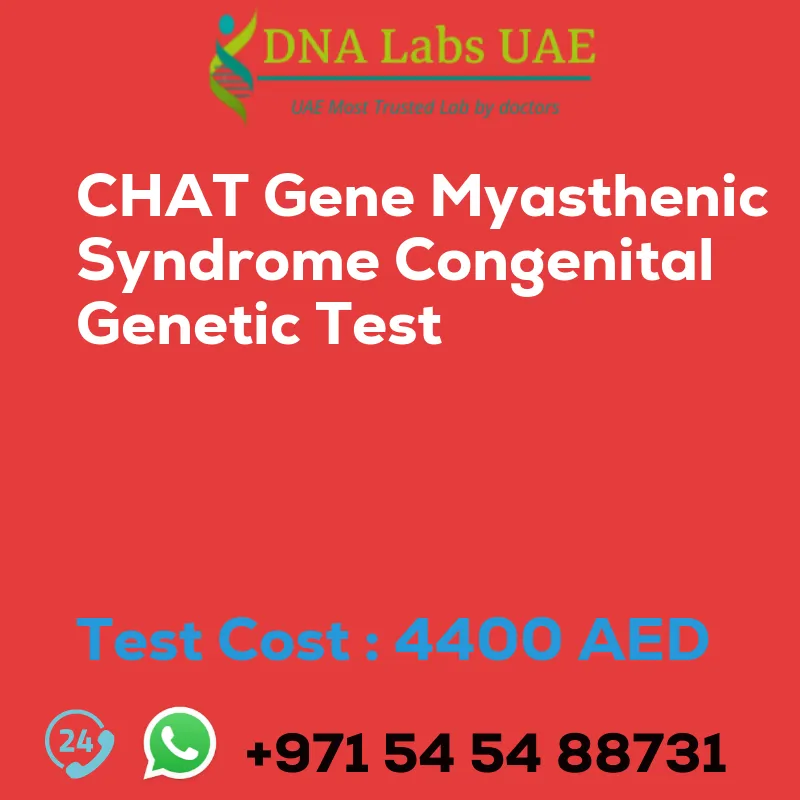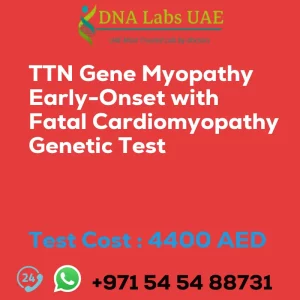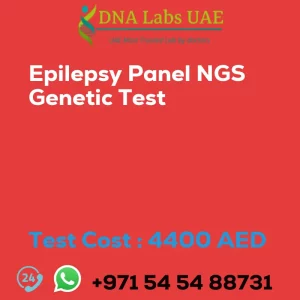CHAT Gene Myasthenic Syndrome Congenital Genetic Test
Test Name: CHAT Gene Myasthenic Syndrome Congenital Genetic Test
Components: NGS Technology
Price: 4400.0 AED
Sample Condition: Blood or Extracted DNA or One drop Blood on FTA Card
Report Delivery: 3 to 4 Weeks
Test Type: Neurological Disorders
Doctor: Neurologist
Test Department: Genetics
Pre Test Information: Clinical History of Patient who is going for CHAT Gene Myasthenic Syndrome Congenital NGS Genetic DNA Test. A Genetic Counselling session to draw a pedigree chart of family members affected with CHAT Gene Myasthenic Syndrome Congenital.
Test Details
NGS (Next-Generation Sequencing) genetic testing is a type of genetic test that uses advanced sequencing technologies to analyze multiple genes simultaneously. It is a powerful tool for diagnosing genetic disorders, including gene myasthenic syndrome, congenital.
Gene myasthenic syndrome, congenital is a group of genetic disorders characterized by muscle weakness and fatigue. It is caused by mutations in genes involved in the neuromuscular junction, which is the connection between nerve cells and muscles.
NGS genetic testing can identify specific mutations in the genes associated with gene myasthenic syndrome, congenital. By analyzing the DNA sequence of these genes, the test can determine if any disease-causing mutations are present.
The benefits of NGS genetic testing for gene myasthenic syndrome, congenital include:
- Comprehensive analysis: NGS can simultaneously analyze multiple genes associated with the syndrome, providing a more comprehensive evaluation compared to traditional genetic testing methods.
- High accuracy: NGS has high sensitivity and specificity, allowing for the detection of even rare mutations associated with gene myasthenic syndrome, congenital.
- Faster results: NGS testing is faster compared to traditional genetic testing methods, enabling quicker diagnosis and potentially earlier intervention and treatment.
- Cost-effective: NGS can analyze multiple genes in a single test, which can be more cost-effective compared to testing each gene individually.
It is important to note that NGS genetic testing should be performed by a qualified geneticist or genetic counselor who can interpret the results accurately and provide appropriate counseling and guidance.
Overall, NGS genetic testing is a valuable tool for diagnosing gene myasthenic syndrome, congenital and can help guide treatment decisions and management strategies for affected individuals.
| Test Name | CHAT Gene Myasthenic syndrome congenital Genetic Test |
|---|---|
| Components | |
| Price | 4400.0 AED |
| Sample Condition | Blood or Extracted DNA or One drop Blood on FTA Card o |
| Report Delivery | 3 to 4 Weeks |
| Method | NGS Technology |
| Test type | Neurological Disorders |
| Doctor | Neurologist |
| Test Department: | Genetics |
| Pre Test Information | Clinical History of Patient who is going for CHAT Gene Myasthenic syndrome, congenital NGS Genetic DNA Test A Genetic Counselling session to draw a pedigree chart of family members affected with CHAT Gene Myasthenic syndrome, congenital |
| Test Details |
NGS (Next-Generation Sequencing) genetic testing is a type of genetic test that uses advanced sequencing technologies to analyze multiple genes simultaneously. It is a powerful tool for diagnosing genetic disorders, including gene myasthenic syndrome, congenital. Gene myasthenic syndrome, congenital is a group of genetic disorders characterized by muscle weakness and fatigue. It is caused by mutations in genes involved in the neuromuscular junction, which is the connection between nerve cells and muscles. NGS genetic testing can identify specific mutations in the genes associated with gene myasthenic syndrome, congenital. By analyzing the DNA sequence of these genes, the test can determine if any disease-causing mutations are present. The benefits of NGS genetic testing for gene myasthenic syndrome, congenital include: 1. Comprehensive analysis: NGS can simultaneously analyze multiple genes associated with the syndrome, providing a more comprehensive evaluation compared to traditional genetic testing methods. 2. High accuracy: NGS has high sensitivity and specificity, allowing for the detection of even rare mutations associated with gene myasthenic syndrome, congenital. 3. Faster results: NGS testing is faster compared to traditional genetic testing methods, enabling quicker diagnosis and potentially earlier intervention and treatment. 4. Cost-effective: NGS can analyze multiple genes in a single test, which can be more cost-effective compared to testing each gene individually. It is important to note that NGS genetic testing should be performed by a qualified geneticist or genetic counselor who can interpret the results accurately and provide appropriate counseling and guidance. Overall, NGS genetic testing is a valuable tool for diagnosing gene myasthenic syndrome, congenital and can help guide treatment decisions and management strategies for affected individuals. |








